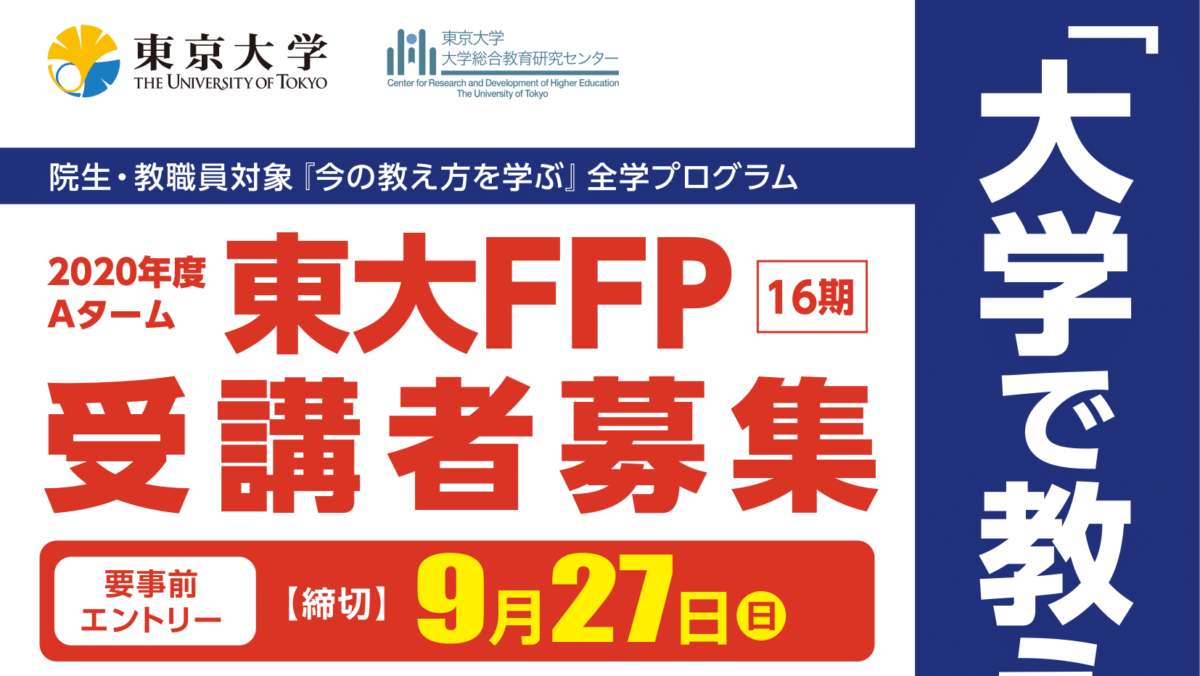Chapter 0 “An Ex-Senior High School Teacher One Day Suddenly Became a Research Support Staff for FFP”
“Nabeta-san, could you write and post a report of FFP classes on the website, the one that Sekido-san used to write? You don’t have to take it seriously! Well…just write it like the food information you always post on Facebook.”
I’m Osami Nabeta (Nabetan), having enjoyed my new life with sudden duties coming from my boss (staff calls it “Dr. Kurita’s unreasonable demands”!) since I started my job here on September 1st.
I came to know Dr. Kurita at a meeting of senior high school teachers on the topic “How to analyze classes in a scientific way based on evidence,” which she attended as an observer, followed by the TP Chart Workshop. I saw her and visited her office then, but I never dreamed that I would be a staff member here to help run FFP.
I finished my job as a teacher at a senior high school at the end of AY2018 and started working as a staff member of SOMA, a nonprofit organization that supports education. I have been thinking about what I can do to support my ex-colleagues at senior high schools and teachers at elementary and junior high schools that I have discussed education with while looking at school from a little different perspective.
I hear that higher education reform is in demand, but elementary and secondary education, especially senior high schools are greatly influenced by the trend of reform. It might be reasonable that the reform of senior high school education comes next to that of higher education.
However, many teachers cannot change themselves immediately nor do they have methods and theories on how they should change. Everyday duties and trying to solve the problems in front of them are all they can handle.
It is difficult to change education in a top-down manner. I believe that schools from now on need someone that accompanies the teachers to help them change themselves. However, my knowledge was not enough for me to become such a person, because I had only superficial knowledge through reading books and didn’t make an effort to learn things systematically. Now that I left school as a teacher, I am determined to learn about education from the beginning thoroughly to become a person who can accompany teachers. I was just about to get started when I came across the three words “Call for Application” of staff members on Facebook.
I came to enter this position after many twists and turns. It’s like learning through working, but this is an ideal environment for me because I can learn from Dr. Kurita’s classes directly with my eyes and feel how the participants earnestly learn there while doing my own jobs such as preparation for FFP and in-class support.
Dr. Kurita stated as follows, which was remarkable in the TP Chart Workshop:
“I believe it is important to make an effort to thoroughly support the participants’ teaching activities by helping them realize their own issues and development through this workshop.”
In addition to my own learning, I would like to do my best to support the participants’ learning through my job.
So that’s all for today. Mr. Sekido’s article on “DAY 0” was an introduction to FFP, but mine started and ended with my own story. Please refer to the outline of FFP on the website and Mr. Sekido’s article on “DAY 0”!
However, the original purpose of this Journal is “to share with viewers what FFP classes are like by posting articles,” so I would like to carefully report DAY 1 from the next article. It will be output through my eyes, so the articles will be written from the perspective of a practitioner of elementary and secondary education, but I will do my best, hoping that my viewpoint will be somewhat beneficial to you.
See you next time!
Osami Nabeta
Research Support Staff (FFP)
Center for Research and Development of Higher Education
(Coordinator, Nonprofit Organization SOMA)


















